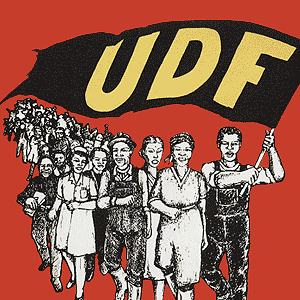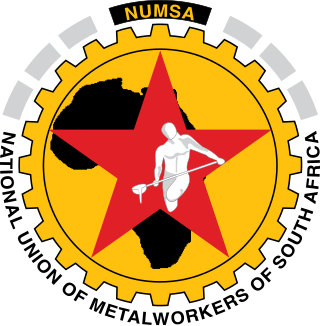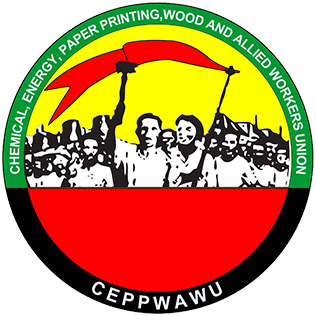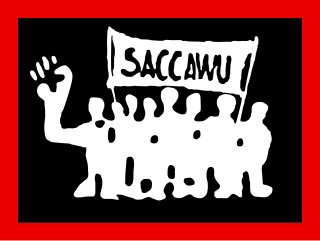Related Research Articles

Prince Mangosuthu Gatsha Buthelezi was a South African politician and Zulu prince who served as the traditional prime minister to the Zulu royal family from 1954 until his death in 2023. He was appointed to this post by King Bhekuzulu, a son of King Solomon, who was a brother to Buthelezi's mother, Princess Magogo. Buthelezi was chief minister of the KwaZulu bantustan during apartheid and founded the Inkatha Freedom Party (IFP) in 1975, leading it until 2019, becoming its president emeritus soon after that. He was a political leader during Nelson Mandela's incarceration (1964–1990) and continued to be so in the post-apartheid era, when he was appointed by Mandela as Minister of Home Affairs, serving from 1994 to 2004.

The Congress of South African Trade Unions is a trade union federation in South Africa. It was founded in 1985 and is the largest of the country's three main trade union federations, with 21 affiliated trade unions.

The United Democratic Front (UDF) was a South African popular front that existed from 1983 to 1991. The UDF comprised more than 400 public organizations including trade unions, students' unions, women's and parachurch organizations. The UDF's goal was to establish a "non-racial, united South Africa in which segregation is abolished and in which society is freed from institutional and systematic racism." Its slogan was "UDF Unites, Apartheid Divides." The Front was established in 1983 to oppose the introduction of the Tricameral Parliament by the white-dominated National Party government, and dissolved in 1991 during the early stages of the transition to democracy.

The National Union of Metalworkers of South Africa (NUMSA) is the biggest single trade union in South Africa with more than 338,000 members, and prior to its expulsion on 8 November 2014, the largest affiliate of the Congress of South African Trade Unions (COSATU), the country's largest trade union federation.

The Chemical, Energy, Paper, Printing, Wood and Allied Workers' Union (CEPPWAWU) is a trade union representing workers in various industries in South Africa.

The South African Commercial, Catering and Allied Workers Union (SACCAWU) is a trade union representing retail, distribution and hospitality workers in South Africa.

The South African Transport and Allied Workers Union (SATAWU) is a trade union in South Africa.
Trade unions in South Africa has a history dating back to the 1880s. From the beginning unions could be viewed as a reflection of the racial disunity of the country, with the earliest unions being predominantly for white workers. Through the turbulent years of 1948–1991 trade unions played an important part in developing political and economic resistance, and eventually were one of the driving forces in realising the transition to an inclusive democratic government.
Operation Marion was a domestic military operation fielded by the South African Defence Force (SADF) during the 1980s. The apartheid security forces trained Inkatha operatives to build an irregular militia.
The Western Cape 2012 Farm Workers' strike was a wave of strikes and protests by agricultural workers in the Western Cape from 27 August 2012 to 22 January 2013. The events led to the deaths of 3 workers, R160 million in damages as well as a 52% increase in the official minimum wage. The protests mostly took place the towns of De Doorns and Worcester with smaller protests in Ceres, Robertson, Grabouw, Wolseley and Villiersdorp. The main cause of the strikes was low worker pay of R69 per day and high unemployment.
The South African Railways and Harbours Union was formed by black workers of the South African Railways and Harbours Administration after they had been expelled from the National Union of Railway and Harbour Servants.
The South African Congress of Trade Unions (SACTU) was a national trade union federation in South Africa.
Zingiswa Phyllis Losi is a South African politician and trade unionist who is currently serving as the president of the Congress of South African Trade Unions (Cosatu) since September 2018. She was formerly Cosatu's second deputy president from 2009 to 2018. She is a member of the Central Committee of the South African Communist Party (SACP) and a former member of the National Executive Committee of the African National Congress (ANC).

The Transport and General Workers' Union (TGWU) was a trade union representing transport workers, and at times workers in other sectors, in South Africa.
The Council of Unions of South Africa (CUSA) was a national trade union federation in South Africa.
The Hotel and Restaurant Workers' Union (HARWU) was a trade union representing hospitality workers in South Africa.
The Liberated Metalworkers' Union of South Africa (LIMUSA) was a trade union representing workers in metal and related industries in South Africa.
Elijah Barayi was a South African trade union leader.
Msokoli Frans Baleni is a South African businessman and former trade unionist who was general secretary of the National Union of Mineworkers between 2006 and 2015. Since 2007, he has been a member of the Central Committee of the South African Communist Party.
Fikile Zachariah "Slovo" Majola is a South African politician and former trade unionist who is currently serving as the Deputy Minister of Trade and Industry since May 2019. He has represented the African National Congress (ANC) in the National Assembly since 2014, and before that he was the general secretary of the National Education, Health and Allied Workers' Union (Nehawu) from 1998 to 2014.
References
- ↑ "UNITED WORKERS' UNION OF SOUTH AFRICA (UWUSA)". Nelson Mandela Foundation. Retrieved 2 May 2021.
- ↑ Forrest, Karen Anne (2005). POWER, INDEPENDENCE AND WORKER DEMOCRACY IN THE DEVELOPMENT OF THE NATIONAL UNION OF METALWORKERS OF SOUTH AFRICA (NUMSA) AND ITS PREDECESSORS: 1980 – 1995 (PDF). Johannesburg: University of the Witwatersrand. Retrieved 2 May 2021.
- ↑ "UWUSA". Truth and Reconciliation Commission. Retrieved 2 May 2021.
- ↑ "Inkathagate: How Buthelezi's cover was blown". Mail & Guardian. 21 April 2010. Retrieved 2 May 2021.